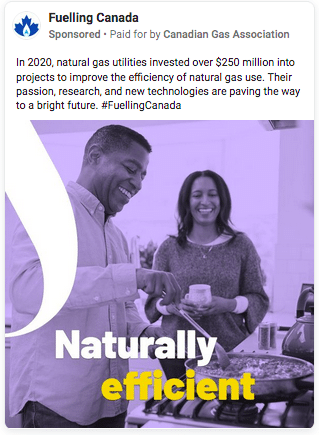In April, the Globe & Mail published an article on its website extolling the virtues of natural gas appliances in people’s houses.
The story, headlined “Why natural gas is the smart choice for your new home,” has the look and feel of actual journalism. It includes statistics about Canada’s “reliable” gas industry, a photo of a young couple cooking on their gas range and quotes from Canadian homebuilders and makers of consumer products—such as grills and fireplaces—that use gas.
It looks explicitly designed to appeal to first-time homebuyers.
But even though natural gas is a major growing source of emissions in the country (Canada is the world’s fourth largest producer of the fossil fuel), the article didn’t once mention climate change, nor the potentially severe health impacts from breathing in gas fumes.
That’s because the article isn’t real journalism, but rather an advertisement paid for by an organization called Fuelling Canada that is linked to some of North America’s top gas companies. It has a small label at the top describing it as “sponsor content.” But otherwise it looks practically identical to news stories from real reporters on the Globe & Mail website.
“That’s what makes these sponsored ads so slimy. For the vast majority of readers who look at stuff very quickly, that nuance is lost on them,” Seth Klein, team lead and director of strategy for an advocacy group called the Climate Emergency Unit, told DeSmog. “The goal of this advertising is to lock us into more decades of using natural gas.”
The Globe Content Studio, the unit at the newspaper that produces its sponsored content, didn’t respond to questions from DeSmog.
Around the time that the Globe & Mail ad appeared, Fuelling Canada was also paying for multiple ads per day on Facebook that in some cases had an estimated audience size of up to 500,000 people, according to publicly available ad data.
It’s spent nearly $22,000 so far on such ads, many of which are specifically targeted to people under age 44, a demographic associated with first-time homebuyers.

“Nearly 50% of all residential consumers rely on natural gas for heating, cooking and fuelling appliances,” one Facebook ad said, featuring an image of an older, smiling couple grilling food on a barbecue. “Natural gas is always available.”
Fuelling Canada describes itself on its website as “a resource hub for Canadians to learn more about natural gas and its essential role in the Canadian economy.” But it is hardly neutral when it comes to discussing one of the world’s major contributors to global warming.
The organization was created by the Canadian Gas Association, an industry group whose members include gas companies like Enbridge and FortisBC, as well as TC Energy, builder of the Coastal GasLink pipeline, a project that has faced fierce opposition led by hereditary chiefs from the Wet’suwet’en First Nation.
Fuelling Canada wants to create the impression of a national grassroots campaign. “[It] is a collaborative of a growing ecosystem of stakeholders who are passionate about gaseous energy,” Paul Cheliak, vice president for strategy and delivery at the Canadian Gas Association, wrote in an email to DeSmog. “These include innovators and cleantech companies, home builders, restaurants, appliance manufacturers, transit agencies and associations.”
The advertising effort is being boosted by the Alberta government.
“How Canada benefits from reliable, affordable natural gas,” reads a post promoting Fuelling Canada earlier this year on the website for the Canadian Energy Centre, a government propaganda organization funded by a carbon tax on heavy polluters and governed by three provincial cabinet ministers.
“The [Canadian Energy Centre], we assume, profiles a series of topics that are of interest to their readership,” Cheliak wrote. “The Canadian Gas Association is not working with the Government of Alberta under any agreement or contractual arrangement related to Fuelling Canada.”
Klein argues it’s not a coincidence that some of the same companies behind Fuelling Canada also belong to an industry alliance that is fighting against municipal rules designed to phase out climate-warming natural gas in homes and buildings and replace them with electric ranges and other cleaner energy sources.
Internal documents describe this “Consortium to Combat Electrification” as a campaign whose mission is to “create effective, customizable marketing materials to fight the electrification/anti-natural gas movement.” The gas industry, one slide explains, is “in for [the] fight of it’s [sic] life.”
The consortium’s members include Enbridge and FortisBC, two of the companies also involved with Fuelling Canada. The major industry players paying for cleverly framed sponsored content promoting natural gas are the very same ones working behind the scenes to stop a shift away from fossil fuels.
“They want to continue to lock in customers in new fossil fuel infrastructure,” Klein said. “And they’re pulling out all the stops.”
Subscribe to our newsletter
Stay up to date with DeSmog news and alerts







